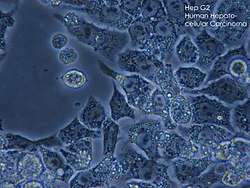Hep G2
Hep G2 (or HepG2) is a human liver cancer cell line.

Hep G2 is an immortal cell line which was derived from the liver tissue of a 15-year-old African American adolescent boy with a well-differentiated hepatocellular carcinoma. These cells are epithelial in morphology, have a modal chromosome number of 55, and are not tumorigenic in nude mice.[1] The cells secrete a variety of major plasma proteins, e.g., albumin, and the acute-phase proteins fibrinogen, alpha 2-macroglobulin, alpha 1-antitrypsin, transferrin and plasminogen. They have been grown successfully in large-scale cultivation systems. Hepatitis B virus surface antigens have not been detected. Hep G2 will respond to stimulation with human growth hormone.
Hep G2 cells are a suitable in vitro model system for the study of polarized human hepatocytes. Another well-characterized polarized hepatocyte cell line is the rat hepatoma-derived hybrid cell line WIF-B[2]. With the proper culture conditions, Hep G2 cells display robust morphological and functional differentiation with a controllable formation of apical and basolateral cell surface domains (van IJzendoorn et al., 1997; 2000, etc.) that resemble the bile canalicular (BC) and sinusoidal domains, respectively, in vivo.
Because of their high degree of morphological and functional differentiation in vitro, Hep G2 cells are a suitable model to study the intracellular trafficking and dynamics of bile canalicular, sinusoidal membrane proteins, and lipids in human hepatocytes in vitro.[3] This can be important for the study of human liver diseases that are caused by an incorrect subcellular distribution of cell surface proteins, e.g., hepatocanalicular transport defects such as Dubin-Johnson Syndrome and progressive familial intrahepatic cholestasis (PFIC), and familial hypercholesterolemia. Hep G2 cells and their derivatives are also used as a model system for studies of liver metabolism and toxicity of xenobiotics[4], the detection of environmental and dietary cytotoxic and genotoxic (and thus cytoprotective, anti-genotoxic, and cogenotoxic) agents,[5] understanding hepatocarcinogenesis , and for drug targeting studies . Hep G2 cells are also employed in trials with bio-artificial liver devices . This can be done using different cell-based kits, such as the IsocypTox.[6]
References
- Hep G2, American Type Culture Collection
- Ihrke, G; Neufeld, EB; Meads, T; et al. (1993). "WIF-B cells: an in vitro model for studies of hepatocyte polarity". Journal of Cell Biology. 123 (6): 1761–1775. doi:10.1083/jcb.123.6.1761. PMC 2290861. PMID 7506266.
- Moscato, Stefania; et al. (2015). "Poly(vinyl alcohol)/gelatin Hydrogels Cultured with Hep G2 Cells as a 3D Model of Hepatocellular Carcinoma: A Morphological Study". Journal of Functional Biomaterials. 6 (6): 16–32. doi:10.3390/jfb6010016. PMC 4384098. PMID 25590431.
- Fanelli, Alex (2016). "HepG2 (liver hepatocellular carcinoma): cell culture". Retrieved 3 December 2017.
- Mersch-Sundermann, V.; Knasmüller, S.; Wu, X. J.; Darroudi, F.; Kassie, F. (2004). "Use of a human-derived liver cell line for the detection of cytoprotective, antigenotoxic and cogenotoxic agents". Toxicology. 198 (1–3): 329–340. doi:10.1016/j.tox.2004.02.009. PMID 15138059.
- Vázquez-Sánchez, María Ángeles. "IsocypTox". Readycell.